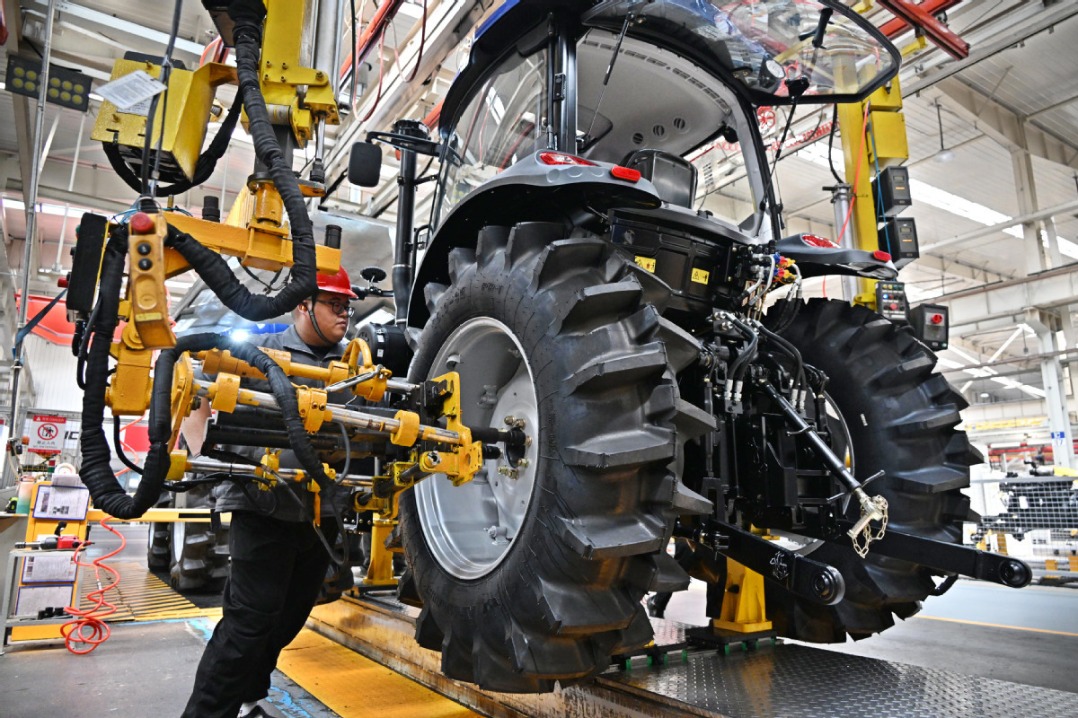Nation's reform efforts hailed by execs, experts
Policy focus on significant strategic sectors helping develop new quality productive forces


China's recent move to deepen economic structural reform is an attempt to cultivate new quality productive forces and foster high-quality development in the long run, offering increasing growth opportunities for stakeholders both at home and abroad, said experts and entrepreneurs.
They said that China's pro-reform efforts will mainly focus on key areas including technological innovation and industrial upgrading, which will help resolve economic woes, create new growth drivers and inject strong impetus into the world's second-largest economy.
Their comments came after President Xi Jinping said in late May that reform should originate from real needs and address the most urgent issues to improve the socialist market economy, with the president calling for efforts to deepen theoretical innovation and promote institutional innovation during the process of solving practical problems.
"Deepening reform, particularly institutional reform, will help remove obstacles and difficulties hindering the development of new quality productive forces, and promote optimal allocation and free flow of production factors including capital, technology and labor," said Liu Quanhong, director of the industrial and technological economics research institute of the Chinese Academy of Macroeconomic Research.
Liu Dian, a researcher at the China Institute of Fudan University, said that China's economy is currently grappling with still-weak demand, prompting calls for further economic structural reform. "The imperative of such reform lies in igniting internal dynamics through institutional innovation, breaking barriers to economic circulation, and restoring market confidence."
He noted that China is facing bottlenecks in its path to high-quality development, such as slow progress in industrial upgrading and overcapacity in some sectors, alongside inadequate high-end supply.
"Market vitality is hampered by financing difficulties faced by small and medium-sized enterprises coupled with high operational costs," he said. "There's a pressing need to enhance innovation capabilities and streamline the technology transfer process, amid a complex external environment impacting domestic circulation and industrial chain security."
In an article published recently in Qiushi Journal, the flagship magazine of the Communist Party of China Central Committee, the National Development and Reform Commission said the country will speed up the process of deepening reform of the economic structure and build a high-level socialist market economy system. The key focus will be on fields including building of a high-standard market system, removing obstacles and difficulties in the development of new quality productive forces, and building a higher-level open economic system.
"China is racing to create a favorable institutional environment for nurturing new quality productive forces, which is conducive to advancing Chinese modernization," said Liu, from the China Institute of Fudan University.
According to a meeting of the Political Bureau of the CPC Central Committee held in late April, the third plenary session of the 20th CPC Central Committee to be held in Beijing in July will focus on further deepening reform and promoting the modernization of China amid challenges at home and complexities abroad.
Robin Xing, chief China economist at Morgan Stanley, said, "We believe the policy focus will remain on enhancing technology innovation and supply chain self-sufficiency in terms of a push for economic reform and a concerted focus on key strategic sectors."
Wang Peng, a researcher at the Beijing Academy of Social Sciences, said the government will introduce more policy measures to support the development of new quality productive forces, including financial subsidies, tax incentives and targeted measures to optimize the business environment.
Highlighting that the concept of new quality productive forces is fully in line with his company's growth strategy, Ye Weiguo, chief operating officer of Gyre Pharmaceuticals, a Beijing-based manufacturer of drugs for organ fibrosis, said the company will continue to invest in new drug development and consistently utilize emerging technologies and new materials to boost its growth.
Gyre Pharmaceuticals, with two plants in Beijing and Cangzhou, Hebei province, invested 104 million yuan ($14.4 million) in research and development activities in 2023, accounting for 13 percent of its annual sales revenue.
Xu Linxiao, president of Changzhou Hongbang New Energy Technology Co, an electric equipment manufacturer based in Changzhou, Jiangsu province, that has more than 150 employees, said the company has intensified its efforts to make innovative products to address market pain points.
Changzhou Hongbang's export value reached 22.94 million yuan in the first four months of 2024, an increase of 2,521.8 percent year-on-year, data from Nanjing Customs showed.
With the global trend of restructuring and upgrading value chains becoming increasingly apparent, innovation-driven growth has become the fundamental approach for Chinese exporters to gain competitiveness and secure a higher position in the world's value chain of high-tech industries, he added.
Global executives hailed China's attempts to further deepen reform and foster new quality productive forces, saying that these measures will create more growth opportunities and help in the transformation of the domestic economy.
Merck China President Marc Horn said, "I think China is very resilient and has shown that it can transform very rapidly and is on a good transformation trajectory."
Zhang Ying, managing director of Dassault Systemes Greater China, said, "With an unwavering commitment to further deepen reform and advance opening-up, China's influence in global industrial, supply and innovation chains has notably increased, providing new opportunities for multinational corporations like Dassault Systemes to tap into its market potential."
Contact the writers at ouyangshijia@chinadaily.com.cn




































